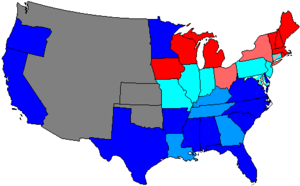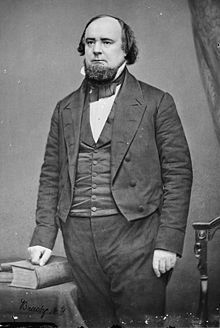35th United States Congress
| 35th United States Congress | |
|---|---|
34th ← → 36th | |
 United States Capitol (1860) | |
March 4, 1857 – March 4, 1859 | |
| Members | 66 senators 237 representatives 7 non-voting delegates |
| Senate majority | Democratic |
| Senate President | John C. Breckinridge (D) |
| House majority | Democratic |
| House Speaker | James L. Orr (D) |
| Sessions | |
| Special: March 4, 1857 – March 14, 1857 1st: December 7, 1857 – June 14, 1858 Special: June 15, 1858 – June 16, 1858 2nd: December 6, 1858 – March 3, 1859 | |
The 35th United States Congress was a meeting of the legislative branch of the United States federal government, consisting of the United States Senate and the United States House of Representatives. It met in Washington, D.C. from March 4, 1857, to March 4, 1859, during the first two years of James Buchanan's presidency. The apportionment of seats in the House of Representatives was based on the 1850 United States census. Both chambers had a Democratic majority.
Major events
[edit]- Panic of 1857
- March 4, 1857. James Buchanan became President of the United States
- March 6, 1857: Dred Scott v. Sandford
- July 18, 1857: Utah Expedition left Fort Leavenworth, effectively beginning the Utah War
- August 21, 1858: First of the Lincoln-Douglas debates was held
- March 3, 1859: Financial appropriations for the improvement and construction of lighthouses.
Major legislation
[edit]Treaties
[edit]- March 12, 1858: Treaty with the Ponca signed[1]
- April 19, 1858: Treaty with the Yankton Sioux signed
- July 29, 1858: Harris Treaty signed with Japan
States admitted
[edit]- May 11, 1858: Minnesota admitted as the 32nd state
- February 14, 1859: Oregon admitted as the 33rd state
Party summary
[edit]Senate
[edit]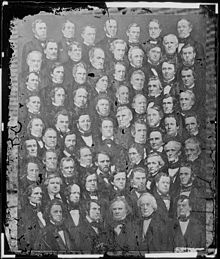
During this congress, two Senate seats were added for each of the new states of Minnesota and Oregon.
| Party (shading shows control) |
Total | Vacant | |||
|---|---|---|---|---|---|
| Know Nothing (A) |
Democratic (D) | Republican (R) |
|||
| End of previous congress | 2 | 40 | 20[a] | 62 | 0 |
| Begin | 4 | 37 | 20 | 61 | 1 |
| End | 42 | 66 | 0 | ||
| Final voting share | 6.1% | 63.6% | 30.3% | ||
| Beginning of next congress | 2 | 38 | 26 | 66 | 0 |
House of Representatives
[edit]During this congress, two House seats were added for the new state of Minnesota and one House seat was added for the new state of Oregon.
| Party (shading shows control) |
Total | Vacant | |||||
|---|---|---|---|---|---|---|---|
| Know Nothing (A) |
Democratic (D) | Independent Democratic (ID) | Republican (R) | Other |
|||
| End of previous congress | 52 | 81 | 0 | 97[b] | 0 | 230 | 4 |
| Begin | 14 | 127 | 0 | 92 | 0 | 233 | 1 |
| End | 130 | 1 | 237 | 0 | |||
| Final voting share | 5.9% | 54.9% | 0.4% | 38.8% | 0.0% | ||
| Beginning of next congress | 6 | 84 | 7 | 113 | 25 | 235 | 2 |
Leadership
[edit]Senate
[edit]
John C. Breckinridge
- President: John C. Breckinridge (D)
- President pro tempore: James M. Mason (D), March 4, 1857, only
- Thomas J. Rusk (D), elected March 14, 1857
- Benjamin Fitzpatrick (D), elected December 7, 1857
House of Representatives
[edit]- Speaker: James L. Orr (D)
Members
[edit]This list is arranged by chamber, then by state. Senators are listed in order of seniority, and representatives are listed by district.
Senate
[edit]Senators were elected by the state legislatures every two years, with one-third beginning new six-year terms with each Congress. Preceding the names in the list below are Senate class numbers, which indicate the cycle of their election. In this Congress, Class 1 meant their term began with this Congress, facing re-election in 1862; Class 2 meant their term ended with this Congress, facing re-election in 1858; and Class 3 meant their term began in the last Congress, facing re-election in 1860.
|
|
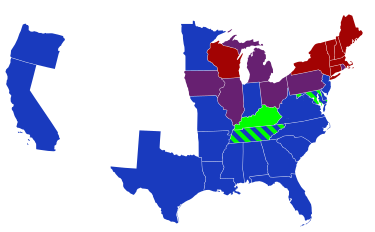 2 Democrats 1 Democrat and 1 Republican 2 Republicans 2 Know-Nothings |
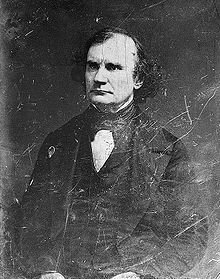 James Murray Mason, March 4, 1857 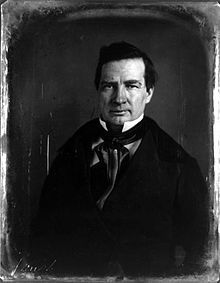 Thomas J. Rusk, March 14, 1857 – July 29, 1857 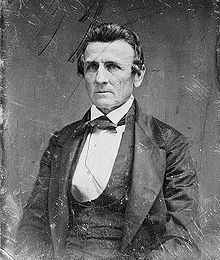 Benjamin Fitzpatrick, from December 7, 1857
|
House of Representatives
[edit]The names of members of the House of Representatives are preceded by their district numbers.
Changes in membership
[edit]The count below reflects changes from the beginning of the first session of this Congress.
Senate
[edit]- Replacements: 5
- Democrats (D): no net change
- Whigs (W): no net change
- Republicans (R): no net change
- Americans (A): no net change
- Deaths: 4
- Resignations: 1
- Interim appointments: 2
- Seats of newly admitted states: 4
- Total seats with changes: 9
| State (class) |
Vacated by | Reason for change | Successor | Date of successor's formal installation[c] |
|---|---|---|---|---|
| Tennessee (1) |
Vacant | Legislature had failed to elect. Successor elected October 8, 1857. |
Andrew Johnson (D) | October 8, 1857 |
| South Carolina (3) |
Andrew Butler (D) | Died May 25, 1857. Successor elected December 7, 1857. |
James H. Hammond (D) | December 7, 1857 |
| New Hampshire (3) |
James Bell (R) | Died May 26, 1857. Successor elected June 27, 1857. |
Daniel Clark (R) | June 27, 1857 |
| Texas (1) |
Thomas J. Rusk (D) | Died July 29, 1857. Successor appointed November 9, 1857. |
J. Pinckney Henderson (D) | November 9, 1857 |
| North Carolina (3) |
Asa Biggs (D) | Resigned May 5, 1858, to become judge of the U.S. District Court for the District of North Carolina. Successor appointed May 7, 1858. Appointee elected November 23, 1858. |
Thomas L. Clingman (D) | May 7, 1858 |
| South Carolina (2) |
Josiah J. Evans (D) | Died May 6, 1858. Successor appointed May 11, 1858. |
Arthur P. Hayne (D) | May 11, 1858 |
| Minnesota (1) |
New seat | Minnesota admitted to the Union May 11, 1858, and its first Senators were elected that day. | Henry M. Rice (D) | May 11, 1858 |
| Minnesota (2) |
New seat | Minnesota admitted to the Union May 11, 1858, and its first Senators were elected that day. | James Shields (D) | May 11, 1858 |
| Texas (1) |
J. Pinckney Henderson (D) | Died June 4, 1858. Successor appointed September 27, 1858. |
Matthias Ward (D) | September 27, 1858 |
| South Carolina (2) |
Arthur P. Hayne (D) | Interim appointee retired. Successor elected December 2, 1858. |
James Chesnut Jr. (D) | December 3, 1858 |
| Oregon (2) |
New seat | Oregon admitted to the Union February 14, 1859, and its first Senators were elected that day. | Delazon Smith (D) | February 14, 1859 |
| Oregon (3) |
New seat | Oregon admitted to the Union February 14, 1859, and its first Senators were elected that day. | Joseph Lane (D) | February 14, 1859 |
House of Representatives
[edit]- Replacements: 10
- Democrats (D): 3 seat net loss
- Whigs (W): 3 seat net gain
- Republicans (R): 1 seat net gain
- Independent Democrats (ID): 1 seat net gain
- Deaths: 5
- Resignations: 6
- Contested election:1
- Seats of newly admitted states: 3
- Total seats with changes: 14
| District | Vacated by | Reason for change | Successor | Date of successor's formal installation[c] |
|---|---|---|---|---|
| Missouri 3rd | Vacant | Rep. James S. Green was elected to this term but resigned after being elected in turn to the US Senate | John B. Clark (D) | Seated December 7, 1857 |
| Indiana 10th | Samuel Brenton (R) | Died March 29, 1857 | Charles Case (R) | Seated December 7, 1857 |
| Pennsylvania 12th | John G. Montgomery (D) | Died April 24, 1857 | Paul Leidy (D) | Seated December 7, 1857 |
| Indiana 1st | James Lockhart (D) | Died September 7, 1857 | William E. Niblack (D) | Seated December 7, 1857 |
| Massachusetts 7th | Nathaniel P. Banks (R) | Resigned December 24, 1857, after being elected Governor of Massachusetts | Daniel W. Gooch (R) | Seated January 31, 1858 |
| North Carolina 8th | Thomas L. Clingman (D) | Resigned May 7, 1858, after being appointed to the US Senate | Zebulon B. Vance (D) | Seated December 7, 1858 |
| Minnesota At-Large | New seat | Minnesota was admitted to the Union May 11, 1858 | James M. Cavanaugh (D) | Seated May 11, 1858 |
| Minnesota Territory At-Large | William W. Kingsbury (D) | Minnesota was admitted to the Union May 11, 1858 | Seat eliminated | |
| Minnesota At-Large | New seat | Minnesota was admitted to the Union May 11, 1858 | William W. Phelps (D) | Seated May 11, 1858 |
| Ohio 3rd | Lewis D. Campbell (R) | Lost contested election May 25, 1858 | Clement Vallandigham (D) | Seated May 25, 1858 |
| Mississippi 5th | John A. Quitman (D) | Died July 17, 1858 | John J. McRae (D) | Seated December 7, 1858 |
| Pennsylvania 8th | J. Glancy Jones (D) | Resigned October 30, 1858 | William H. Keim (R) | Seated December 7, 1858 |
| Illinois 6th | Thomas L. Harris (D) | Died November 24, 1858 | Charles D. Hodges (D) | Seated January 4, 1859 |
| New York 4th | John Kelly (D) | Resigned December 25, 1858 | Thomas J. Barr (D) | Seated January 7, 1859 |
| Oregon Territory At-Large | Joseph Lane (D) | Oregon was admitted to the Union February 14, 1859 | Seat eliminated | |
| Oregon At-Large | New seat | Oregon was admitted to the Union February 14, 1859 | La Fayette Grover (D) | Seated February 14, 1859 |
Committees
[edit]Lists of committees and their party leaders.
Senate
[edit]- Audit and Control the Contingent Expenses of the Senate (Chairman: Josiah J. Evans then William Wright)
- Banks of the District of Columbia (Select)
- Claims (Chairman: Alfred Iverson Sr.)
- Commerce (Chairman: Clement Claiborne Clay)
- Distributing Public Revenue Among the States (Select)
- District of Columbia (Chairman: Albert G. Brown)
- Engrossed Bills (Chairman: William Wright)
- Finance (Chairman: Robert M.T. Hunter)
- Foreign Relations (Chairman: James M. Mason)
- French Spoilations (Select)
- Indian Affairs (Chairman: William K. Sebastian)
- Judiciary (Chairman: James A. Bayard Jr.)
- Military Affairs (Chairman: Jefferson Davis)
- Military Asylum near Washington, D.C. (Select)
- Militia (Chairman: N/A)
- Naval Affairs (Chairman: Stephen Mallory)
- Ordnance and War Ships (Select)
- Pacific Railroad (Select)
- Patents and the Patent Office (Chairman: David S. Reid)
- Pensions (Chairman: George Wallace Jones)
- Post Office and Post Roads (Chairman: David Levy Yulee)
- Printing (Chairman: Robert W. Johnson)
- Private Land Claims (Chairman: Judah P. Benjamin)
- Public Buildings and Grounds (Chairman: Jesse D. Bright)
- Public Lands (Chairman: Charles E. Stuart)
- Retrenchment (Chairman: Stephen A. Douglas)
- Revolutionary Claims (Chairman: Josiah J. Evans)
- Tariff Regulation (Select)
- Territories (Chairman: N/A)
- Whole
House of Representatives
[edit]- Accounts (Chairman: John C. Mason)
- Agriculture (Chairman: William G. Whiteley)
- Claims (Chairman: Samuel S. Marshall)
- Commerce (Chairman: John Cochrane)
- District of Columbia (Chairman: William O. Goode)
- Elections (Chairman: Thomas L. Harris)
- Engraving (Chairman: Garnett B. Adrain)
- Expenditures in the Navy Department (Chairman: John B. Haskin)
- Expenditures in the Post Office Department (Chairman: Albert G. Talbott)
- Expenditures in the State Department (Chairman: Owen Jones)
- Expenditures in the Treasury Department (Chairman: William Lawrence)
- Expenditures in the War Department (Chairman: Wilson Reilly)
- Expenditures on Public Buildings (Chairman: Allison White)
- Foreign Affairs (Chairman: Thomas L. Clingman)
- Indian Affairs (Chairman: Alfred B. Greenwood)
- Invalid Pensions (Chairman: Joshua H. Jewett)
- Judiciary (Chairman: George S. Houston)
- Manufactures (Chairman: William D. Bishop)
- Mileage (Chairman: Robert Smith)
- Military Affairs (Chairman: John A. Quitman)
- Militia (Chairman: Israel T. Hatch)
- Naval Affairs (Chairman: Thomas S. Bocock)
- Patents (Chairman: James A. Stewart)
- Post Office and Post Roads (Chairman: William H. English)
- Private Land Claims (Chairman: John M. Sandidge)
- Public Buildings and Grounds (Chairman: Lawrence M. Keitt)
- Public Expenditures (Chairman: John M. Elliott)
- Public Lands (Chairman: Williamson R. W. Cobb)
- Revisal and Unfinished Business (Chairman: William L. Dewart)
- Revolutionary Claims (Chairman: Samuel S. Cox)
- Revolutionary Pensions (Chairman: John Hickman)
- Roads and Canals (Chairman: George W. Jones)
- Rules (Select)
- Standards of Official Conduct
- Territories (Chairman: Alexander H. Stephens)
- Ways and Means (Chairman: J. Glancy Jones then John S. Phelps)
- Whole
Joint committees
[edit]- Enrolled Bills (Chairman: Rep. Thomas G. Davidson)
- The Library (Chairman: Rep. William H. Dimmick)
- Printing (Chairman: Rep. Samuel A. Smith)
Caucuses
[edit]- Democratic (House)
- Democratic (Senate)
Employees
[edit]Legislative branch agency directors
[edit]Senate
[edit]House of Representatives
[edit]- Chaplain: None
- Clerk: James C. Allen
- Doorkeeper: Robert B. Hackney, until May 17, 1858
- Joseph L. Wright, elected May 18, 1858
- Messenger: Thaddeus Morrice
- Sergeant at Arms: Adam J. Glossbrenner
- Postmaster: Michael W. Cluskey
- Reading Clerks: [data missing]
See also
[edit]- 1856 United States elections (elections leading to this Congress)
- 1858 United States elections (elections during this Congress, leading to the next Congress)
Notes
[edit]- ^ a b c d United States representatives were elected statewide on a general ticket.
- ^ Opposition
- ^ Opposition
- ^ a b When seated or oath administered, not necessarily when service began.
References
[edit]- Specific citations
- ^ Charles J. Kappler, ed. (1904). "Treaty with the Ponca, 1858". Indian Affairs: Laws and Treaties. Washington D.C.: Government Printing Office. Archived from the original on 2015-02-13. Retrieved 2013-11-09.
The Ponca tribe of Indians hereby cede and relinquish to the United States all the lands now owned or claimed by them, wherever situate, except the tract bounded as follows, viz: Beginning at a point on the Neobrara River and running due north, so as to intersect the Ponca River 25 miles from its mouth; thence from said point of intersection, up and along the Ponca River, twenty — miles; thence due south to the Neobrara River; and thence down and along said river to the place of beginning...
- General references
- Martis, Kenneth C. (1989). The Historical Atlas of Political Parties in the United States Congress. New York: Macmillan Publishing Company.
- Martis, Kenneth C. (1982). The Historical Atlas of United States Congressional Districts. New York: Macmillan Publishing Company.
External links
[edit]- Statutes at Large, 1789-1875
- Senate Journal, First Forty-three Sessions of Congress
- House Journal, First Forty-three Sessions of Congress
- Biographical Directory of the U.S. Congress
- U.S. House of Representatives: House History
- U.S. Senate: Statistics and Lists
- Congressional Directory for the 35th Congress, 1st Session. 1857.

